The Fall Returns: Interview with writer/creator Allan Cubitt
Gavin Collinson
BBC Writersroom
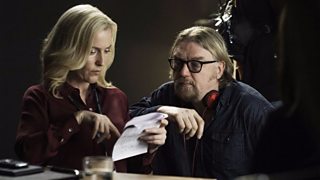
The Fall returns to BBC Two on Thursday, 29 September at 9pm. The six-part series is once again written by the show’s creator and director, Allan Cubitt, whom we recently caught up with…
Question: Where do we find Gibson and Spector at the start of this series?
Allan Cubitt: The story picks up from the point that series two ended, May 2012, with Spector, shot from close-range by James Tyler, dying in Gibson’s arms, the helicopter unable to land because of the trees and panic, chaos and confusion on the ground with three men down.
Q: How does series three differ from previous series?
AC: Hopefully it represents an organic development, just as series two was a development from series one. It’s a real privilege to be able to explore one story across three seasons. I always wanted The Fall to have a forensic quality and hopefully the story goes deeper and deeper in its exploration of the central characters - and some of the subsidiary characters too - and its main themes and preoccupations.
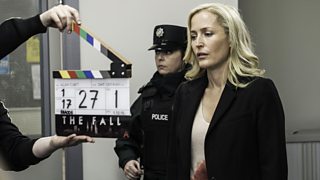
Gillian Anderson as Gibson in the latest series of The Fall,
Q: What challenges will Gibson face in this series?
AC: Gibson’s challenges remain the same: they just become, I hope, deeper and more existential as the drama unfolds. I always wanted The Fall to have a mythic quality if possible. We glimpsed Gibson in her ordinary world at the start of episode one, series one. She’s at home in sweat pants, a vest and a facemask, frantically cleaning up and packing before leaving for Belfast. In that sense the call to adventure has preceded the opening of the show.
When we see her arrive in Belfast, presenting ‘a face to meet the faces that you meet’ she is crossing the threshold, leaving the ordinary world and entering a new region or condition with unfamiliar rules and values where she will be tested. She is there to do a 28-day review of a single murder that remains unsolved, no suspects. She makes the connection between that murder and others and pushes Burns into putting her in charge of the inquiry. At that point her ordeal begins!
The dramatic question from that point onwards has always been will she succeed, will she survive - does she have the power to transform the situation? Can she, and the drama, reunite with the feminine, can the healing begin?
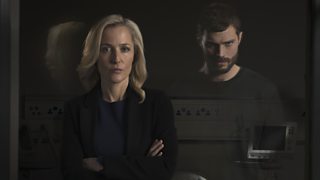
Facing the future: Gibson and Spector.
Q: We know this is the climax of the cat and mouse game between Gibson and Spector. Which of them do you think is cleverer?
AC: I’m not sure that cleverness is the issue at play. Hopefully the intelligence of both is demonstrated. While Spector likes to parade his intellectual qualities it’s debatable whether he fully understands the concepts he is playing with. Gibson would see them as selective and self-serving. He uses - or rather misuses, misrepresents - Nietzsche, Sartre, Camus etc. to explain away his appalling deeds. He accuses Gibson of the same moral relativism, but he’s wrong.
Gibson does not believe in certain moral absolutes, nor does she need to hang her sense of right and wrong on any convenient religious hooks. For her, no matter how much random death and destruction there is in the world, it is utterly wrong to rob another human being of life - even Spector himself. Spector might think he lives in an authentic way but Gibson suggests the opposite. She tells him in series one that he is trapped, a slave to his compulsions. She also points out that his own family are potential victims as well.
Cleverness suggests to me a degree of wisdom. Someone once said wisdom is the ability to use experience to solve problems. Spector’s way of dealing with the overwhelming feelings of rage and fear he experiences is the opposite of clever. As he points out to Katie, serial murder is a form of slow suicide, fundamentally stupid, an absurd way of trying to assuage the anger he feels, or satisfy his cravings or achieve a form of peace. In creating Gibson I was attempting to override the problematic patriarchal expectation that the man assumes the dominant role and retains power. Gibson is the dominant voice in the drama and I’ve always thought of her as the cleverest person in the room, including when she’s sitting opposite Spector. I’ve just tried to make Spector a worthy adversary.
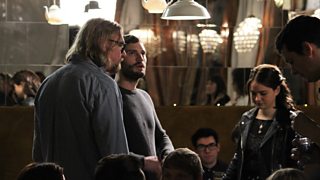
Allan on the set of series 2 with Jamie Dornan and Aisling Franciosi.
Q: Are the stakes at the highest yet in series three?
AC: I’d like to say yes! The audience will have to judge for themselves. It’s always been a life and death struggle between the two of them.
Q: Why do you think The Fall has been so successful?
AC: Has it been a success? I’ll take your word for it! For me it’s just about making it as good as I can. Taking an initial idea and turning it bit by bit into a finished drama is always a challenging and demanding thing to do. When it’s finally ready to be seen you just hope it finds an audience and that at least a proportion of that audience are engaged by it - hopefully moved and stimulated by what’s going on.
One of the things that I do consider successful was the casting of Gillian and Jamie. It’s impossible for me to imagine their parts being played better by anyone else. So let’s say it’s down to them, a superb supporting cast and brilliant people like my editor Steve Singleton who help shape the material.
Q: Did you have in mind how the story would end from when you first started writing The Fall?
AC: I always knew how it would end but there have been all sorts of discoveries along the way. The characters are very vivid to me and often seem to dictate the direction of the story, even the horrifying developments. What will be will be.
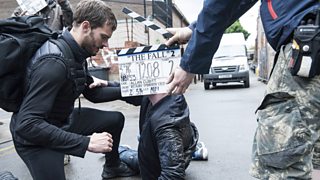
Jamie Dornan during the filming of series 2 on the streets of Belfast.
Q: What was it like returning to Belfast to film this series? How important is the Belfast setting to the show?
AC: I didn’t return because I never left! I wrote series three in Belfast. The setting has always been of crucial importance. Dramas need a strong sense of time (2012 in our case!) and place to work. Belfast provides that. The history of the place informs the characters as well, particularly the older characters - Burns, Eastwood, Father Jensen - but also characters like Tyler and Nash. I also discovered a really rich vein of actors from the North and the South of Ireland that have brought so much to The Fall and help make it feel authentic and particular.
Q: What was it like to film? Was it nice to be reunited with the cast and crew?
AC: Filming is hard work but deeply rewarding. There’s no hiding place, but at least it means you stand or fall on the basis of your own efforts - the best you’ve been able to achieve under the particular circumstances that exist. The cast and crew are exceptional and working on The Fall has been the highlight of my career thus far. It’s hard to imagine working with a better group of people. We reconvened for series three as old friends and welcomed new additions to the cast and crew with open arms.
I like to work in an atmosphere of mutual respect and love - that’s what I try to make happen on a daily basis as best I can. The Fall, despite its dark subject matter, has always seemed to me to be about the healing power of love and the importance of giving children the love and support they need to stand a chance of becoming fully formed, fully functioning adults. Melanie Klein said if every child who showed disturbances that are at all severe - like Spector’s - were to be analysed in good time, a great number of people who later end up in prisons or mental institutions, or who go completely to pieces, would be saved from such a fate and be able to develop a normal life. Parenting is a big responsibility and probably the most important thing any of us ever do.
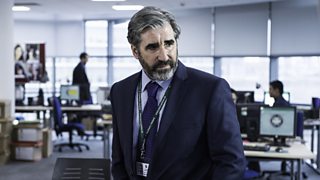
John Lynch returns as Jim Burns.
Q: Some great new cast have joined for series three, can you tell us a bit about them?
AC: I’m very excited about our new cast members all of whom make a really telling contribution to the show I think. Incidentally the casting of Krister Henriksson, the first Wallander, had nothing to do with the popularity of Scandinavian drama and everything to do with making the character I’d created as believable as possible. I was surprised how nervous I was when he first came on set but I was aware that this was an actor who had worked with Ingmar Bergman on a number of occasions, very experienced and a highly regarded stage actor. In fact he was a dream to work with, a lovely, special man. He has the qualities that I’m always looking for in The Fall, an understated emotional intelligence, and the capacity to subtly express great depth of feeling through the eyes, a humanity, and vulnerability.
All qualities incidentally that I see in Aisling Bea as an actress. I’m very excited about her contribution. Richard Coyle, Kelly Campbell, Hugh O'Connor, Genevieve O'Reilly, Aidan McCardle, Barry Ward, Ruth Bradley, Martin McCann, Conor MacNeill and Denise Gough, the list goes on. But then I’m very well served by all my actors. I can put the camera on Ruth or Niamh McGrady or Bronagh Taggart and ask them to listen and know I will get great material. Just like Sean McGinley in series two, Genevieve and Marty were only in for one day each but nailed their parts.
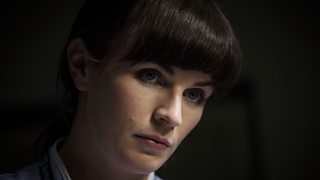
Nurse Sheridan, played by Aisling Bea.
Q: Other familiar faces this series other than Gibson and Spector, how important is that to this series?
AC: Series three is very reliant on those familiar faces, particularly John Lynch, Aisling Franciosi, Valene Kane and Colin Morgan. They all make very significant contributions.
Q: What can audiences expect from The Fall series three?
AC: I hope that fans of the show will feel satisfied by the way the story develops, by the journeys the central characters go on. And maybe those people who are sceptical and have reservations will be won round - you can but hope! You do the best you can and then you put it out there. People will make of it what they will.
Want more inside info on the new series? Check out The Fall Returns: What You Need to Know!
